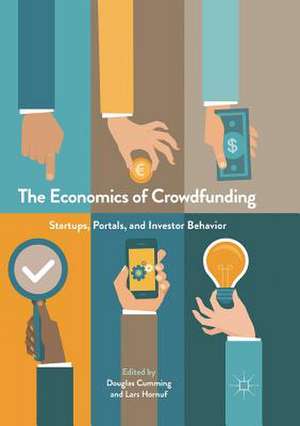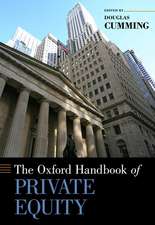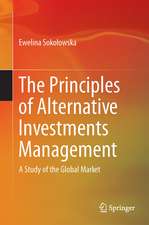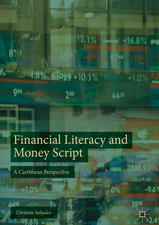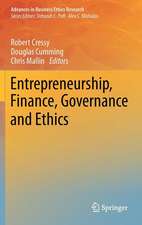The Economics of Crowdfunding: Startups, Portals and Investor Behavior
Editat de Douglas Cumming, Lars Hornufen Limba Engleză Paperback – 6 iun 2019
| Toate formatele și edițiile | Preț | Express |
|---|---|---|
| Paperback (1) | 997.09 lei 6-8 săpt. | |
| Springer International Publishing – 6 iun 2019 | 997.09 lei 6-8 săpt. | |
| Hardback (1) | 1002.31 lei 6-8 săpt. | |
| Springer International Publishing – 8 feb 2018 | 1002.31 lei 6-8 săpt. |
Preț: 997.09 lei
Preț vechi: 1215.96 lei
-18% Nou
Puncte Express: 1496
Preț estimativ în valută:
190.81€ • 207.20$ • 160.29£
190.81€ • 207.20$ • 160.29£
Carte tipărită la comandă
Livrare economică 22 aprilie-06 mai
Preluare comenzi: 021 569.72.76
Specificații
ISBN-13: 9783319881812
ISBN-10: 3319881817
Pagini: 283
Ilustrații: XX, 283 p. 29 illus.
Dimensiuni: 148 x 210 mm
Greutate: 0.36 kg
Ediția:Softcover reprint of the original 1st ed. 2018
Editura: Springer International Publishing
Colecția Palgrave Macmillan
Locul publicării:Cham, Switzerland
ISBN-10: 3319881817
Pagini: 283
Ilustrații: XX, 283 p. 29 illus.
Dimensiuni: 148 x 210 mm
Greutate: 0.36 kg
Ediția:Softcover reprint of the original 1st ed. 2018
Editura: Springer International Publishing
Colecția Palgrave Macmillan
Locul publicării:Cham, Switzerland
Cuprins
1: Introduction.- Part I Startups.- 2: Crowdfunding as a New Financing Tool.- 3: Signaling to Overcome Inefficiencies in Crowdfunding Markets.- 4: The Crowd-Entrepreneur Relationship in Startup Financing.- 5: Fraudulent Behavior by Entrepreneurs and Borrowers.- Part II Market Structure.- 6: Fintech and the Financing of SMEs and Entrepreneurs: From Crowdfunding to Marketplace Lending.- Part III Backers and Investors.- 7: Crowdfunding as a Font of Entrepreneurship: Outcomes of Reward-Based Crowdfunding.- 8: Crowdfunding Creative Ideas: The Dynamics of Project Backers.- Part IV Recent Regulatory Efforts.- 9: The Regulation of Crowdfunding in the United States. 10: The Regulation of Crowdfunding in Europe.- 11: Individual Investors’ Access to Crowdinvesting: Two Regulatory Models.
Notă biografică
Douglas Cumming is a Professor of Finance and Entrepreneurship and the Ontario Research Chair at the Schulich School of Business, York University, Canada. Douglas has published over 140 articles in leading refereed academic journals in finance, management, and law and economics. He is the incoming Editor-in-Chief of the Journal of Corporate Finance (January 2018), and a Co-Editor of Annals of Corporate Governance, Finance Research Letters, and Entrepreneurship Theory and Practice. He is the author and editor of over a dozen books. Douglas’ work has been reviewed in numerous media outlets, including The Economist, The New York Times, and The New Yorker.
Lars Hornuf is a Professor of Finance at the University of Bremen, Germany. He was a visiting scholar at UC Berkeley, Stanford University, Duke University, and Georgetown University. From 2014 to 2017 Lars held a grant from the German Research Foundation on “Crowdinvesting in Germany, England and the USA: Regulatory Perspectives and Welfare Implications of a New Financing Scheme.” In 2016, he wrote two expert reports for the Federal Ministry of Finance on the German FinTech market and the Small Investor Protection Act. Lars’ work has been covered in newspapers like The Economist and Foreign Policy.
Lars Hornuf is a Professor of Finance at the University of Bremen, Germany. He was a visiting scholar at UC Berkeley, Stanford University, Duke University, and Georgetown University. From 2014 to 2017 Lars held a grant from the German Research Foundation on “Crowdinvesting in Germany, England and the USA: Regulatory Perspectives and Welfare Implications of a New Financing Scheme.” In 2016, he wrote two expert reports for the Federal Ministry of Finance on the German FinTech market and the Small Investor Protection Act. Lars’ work has been covered in newspapers like The Economist and Foreign Policy.
Textul de pe ultima copertă
'For academics, practitioners and government policymakers, this book provides a sophisticated, comprehensive analysis of this new and important means of capital aggregation across for-profit and nonprofit sectors worldwide.'
'It is important that we recognize and respond to the opportunities and challenges arising from innovative methods of financing, such as crowdfunding. This book provides a review of the experience to date, covering important issues such as signaling, fraud, and regulatory models. The insights here are relevant to academics, entrepreneurs, investors, and policymakers.'
-
Maureen Jensen, Chair and CEO of the Ontario Securities Commission
This book focuses on various types of crowdfunding and the lessons learned from academic research. Crowdfunding, a new and important source of financing for entrepreneurs, fills a funding gap that was traditionally difficult to close. Chapters from expert contributors define and carefully evaluate the various market segments: donation-based and reward-based crowdfunding, crowdinvesting and crowdlending. They further provide an assessment of startups, market structure, as well as backers and investors for each segment. Attention is given to the theoretical and empirical findings from the recent economics and finance literature. Furthermore, the authors evaluate relevant regulatory efforts in several jurisdictions. This book will appeal to finance, entrepreneurship and legal scholars as well as entrepreneurs and platform operators.
- Michael Klausner, Nancy and Charles Munger Professor of Business and Professor of Law, Stanford University
'This is an excellent book, a must-read, for anyone interested in the broad phenomenon of crowdfunding.'
- Mingfeng Lin, Associate Professor of Management Information Systems, University of Arizona'It is important that we recognize and respond to the opportunities and challenges arising from innovative methods of financing, such as crowdfunding. This book provides a review of the experience to date, covering important issues such as signaling, fraud, and regulatory models. The insights here are relevant to academics, entrepreneurs, investors, and policymakers.'
-
Caracteristici
Brings together rigorous research in crowdfunding by leading academic scholars Provides an overview and comparison of the different subcategories of crowdfunding Offers an overview of the early and most recent literature on crowdfunding Includes discussion of recent regulatory efforts in the United States and Europe
